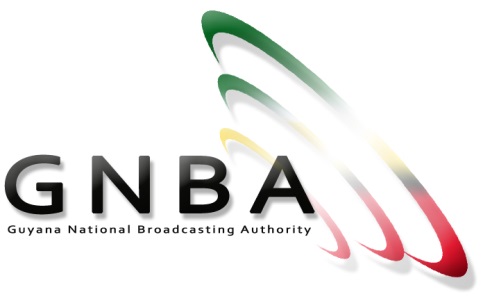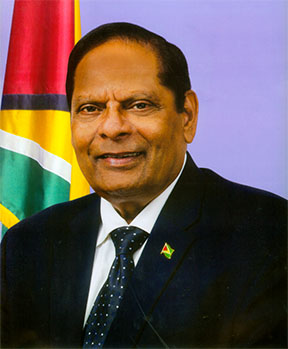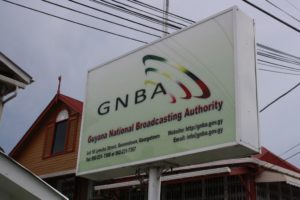Prime Minister seeks to alleviate concerns about Broadcast Amendment Bill
– Says it serves National Interest
Prime Minister Moses Nagamootoo has penned a missive that aims to educate the public about the content of the Broadcast Amendment Bill 2017. He said that much of the concerns expressed are misdirected. While there have been local and international calls for President David Granger to withhold his assent from the Bill, Nagamootoo said that this will not happen. He noted that the President’s assent “cannot be delayed by vested and parochial political interests, and by misconceived or misinformed arguments.” The Prime Minister said that the amendments are required, with “some urgency, in the public interest.”
In some quarters, there has been a gross misunderstanding and, in a few instances, deliberate misrepresentation of the recent amendments to the Broadcasting Act. This Act was signed into law on September 27, 2011 by then President Jagdeo.
It is apparent that those who have expressed some sort of opposition to the amendments did not examine carefully the provisions of the 2011 Act, which the amendments seek to give effect, as authorized by the said Act. In most cases, the amendments give clarity to certain Sections and also, add certainty to them.
These amendments were recommended by the Guyana National Broadcasting Authority GNBA, and tabled by me in the National Assembly as an AMENDMENT Bill, after statutory consultation with the National Frequency Management Unit (NFMU), as required by the 2011 Act.
I will explore the changes made by the amendments, starting with the interpretation assigned to certain terms in the Act.
- DEFINITION
In the ACT “broadcasting service” means a service providing broadcasting.
The AMENDMENT gives clarity to this definition and amplifies that “broadcasting service” means a service providing broadcasting and includes – (i) a television broadcasting service; and (ii) a radio (sound) broadcasting service”.
The ACT has no definition for “public service broadcasting” though it makes provision for broadcasters to provide “certain percentage” of time for such broadcasting.
The AMENDMENT fills the gap, defining “public service broadcasting” as the broadcast of a programme produced for the purpose of informing and educating the public, and promoting policies and activities of the Government that benefit the public as a whole”.
- PUBLIC SERVICE BROADCAST
The ACT gives the Guyana National Broadcasting Authority (GNBA), in Section 18 (2), powers to –
(i) require licensees to carry information on any programmes issued by the Civil Defence Commission, the Guyana Police Force, Guyana Fire Service and or health services, and certain other programmes as public information deemed appropriate and necessary in terms of national security, emergency and disaster as a public service AT NO COST;”
(k) “require licensees to carry A CERTAIN PERCENTAGE of public service broadcast or development support broadcast as public information deems (sic) appropriate as a public service AT NO COST.”
“Development support broadcast” has long been recognized as relating to Government development programmes.
- CERTAIN PERCENTAGE – is now limited
That vague “certain percentage” in the original Act, EXCLUDES “information issued by the Civil Defense Commission, the Guyana Police Force” etc., and therefore, could have been interpreted as requiring additional free broadcast time to the “certain percentage” to which I have already alluded..
The AMENDMENT seeks to place a maximum cap on the “certain percentage” which will now include notices of the Civil Defence Commission, Police Force, etc., and limits it to between one minute and sixty minutes daily.
The Amendment says in Section 8. (1) Every broadcasting agency shall broadcast public service programmes in the following manner-
(a) for a total of up to sixty minutes per day;
(b) between 6:00 hrs and 22:00 hrs; and
(c) free of cost.
The sixty minutes referred to shall INCLUDE time allotted for any –
(a) address to the Nation by the President;
(b) emergency notice or disaster warning issued by the Civil Defence Commission, the Guyana Police Force, Guyana Fire Service, the Minister of Public Health and the Government generally by any agency duly authorized.
- CLASSES OF LICENCE– now clearly defined
The ACT says in Section 17 (1): The Authority shall be responsible for the regulation, supervision and development of national broadcasting, including PRIVATE, PUBLIC and COMMUNITY broadcasting. And in Section 18, it adds: The Authority shall establish classes of licences.
The AMENDMENT provides for these “classes of licences” and creates a structure for their proper operation, as required by the Act.
It says in Section 21A that a television broadcasting service or a radio broadcasting service shall be of the following classes:-
- Commercial, where 80% of revenue comes from advertisement and sale of airtime;
- Non-commercial, where funding comes mainly from donors; and
- Community, where a Board elected by a geographic area runs the station for the community and in its interest.
To accommodate these classes of operators, the AMENDMENT allows for zones to be created – primary, secondary and tertiary zones in various geographic locations to ensure that the entire country is covered by broadcasting from one medium or the other.
The GNBA is vested with powers to do these things and much more, as the ACT allows it to amend any condition of a licence on application of the licensee or on the Authority’s own motion; issue renewals of licences; suspend or revoke any licence; require licensees to carry public information broadcast as public service at no cost, etc.
- FEES– significantly reduced
Under a Schedule of the existing 2011 Act, all operators were required to pay a flat fee of $2,500,000 for a broadcasting licence, whether the agency has nationwide reach or is confined to a specified and limited location. The imposition by the former Government of an across-the-board $2.5 million fee, resulted in most licensees not paying the fees, and they have voluntarily become unlicensed, some since 2012. Reports indicate that broadcasters owe an estimated $125 million to the GNBA; and only eight (8) of them are in conformity with licensing requirements under law.
But the AMENDMENT relieves operators from what I had described in the National Assembly as “the kleptocratic obsession” of the former government to levy heavy fees. The Amendment substitutes a new Table of Fees that, except for a license to operate radio in the primary (populated) zone, significantly reduces the fees.
The new Fee for television in the primary zone is slashed to $1,200,000. The licence fees for secondary and tertiary zones are $600,000 and $300,000 respectively. These fees are also applicable to cable. A community radio licence fee is only $150,000.
- TRANSFER OF LICENCE
The ACT contains in Section 19 the broadcasting policy for Guyana that ensures that Broadcasting services are effectively owned and controlled by –
- (i) Guyanese nationals;
- (ii) Guyanese nationals and CARICOM nationals: Provided that in the case of CARICOM nationals their ownership and control shall be subject to there being RECIPROCAL PROVISIONS governing broadcasting by the Member State of which the CARICOM national is a citizen..”
We know of cases where broadcasting licences have been ostensibly transferred to non-Guyanese nationals. In cases where such licensees had sold or transferred their broadcasting rights and interests, there would be need to review such transfers in keeping with requirements as regards (a) zoning and (b) status of transferees under the 2011 Act., Under the 2011 Act, a licence could not be transferred to any other person without the written consent of the GNBA.
- TERROR THREATS
The broadcasting policy in the ACT ensures compliance by broadcasters with the Constitution and laws of Guyana and requires them not to incite violence, ethnic, religious or cultural hostility. It provides for review of broadcasting rules that regulate content that violates the Constitution, stimulates sexual violence and abuses women’s and children’s rights etc.
The AMENDMENT amplifies this section, in keeping with new developments, and in Section 39B provides that a broadcasting agency shall not broadcast advertisements or programmes which contain HATE SPEECH, RACIAL INCITEMENT or TERROR THREATS.
This cannot be an interference with free speech! This is in keeping with the Guyana Constitution which, in Article 146 (3), states that “Freedom of expression does not relate to hate speech or other expressions, capable of exciting hostility”.
It is my strong and confident submission that freedom of the press or of expression is not violated where any law provides for an action to be taken in the interest of defence, public safety, public order, public morality or public health; or for regulating broadcasting or television services.
- REQUIREMENT TO RE-APPLY
Depending on the class of service or the zone for which the licence is granted, all broadcasters, including the State radio and television, have to fill out the new application forms that are part of the Broadcasting Regulations (the Amendment).
This was a requirement in 2011 as the Act stipulates that all legitimate broadcasters must submit application for continuation of broadcasting within 30 days of the said Act coming into effect. A person who wanted to start broadcasting service had to apply for a licence under the new conditions in the Act.
The 2017 AMENDMENT Bill re-applies this requirement for submission of application in keeping with the classes of licences, the zoning for operations and the adjusted fees for the different zones.
This is a practical measure, and logical within the context of the adjusted broadcasting landscape, which was done in full conformity with the existing Broadcasting law.
The Opposition-driven allegations that the amendments violate the Constitution, breach international treaties and conventions, “kill” freedom of the press and take away “proprietary interests” of broadcasters, are totally without merit, and form part of the partisan political propaganda against the need for modern legislative changes in Guyana.
The assent of His Excellency, President David Granger, to the Broadcasting (Amendment) Bill 2017 cannot be delayed by vested and parochial political interests, and by misconceived or misinformed arguments. The amendments are required, with some urgency, in the public interest.
Article by Kaieteur News



